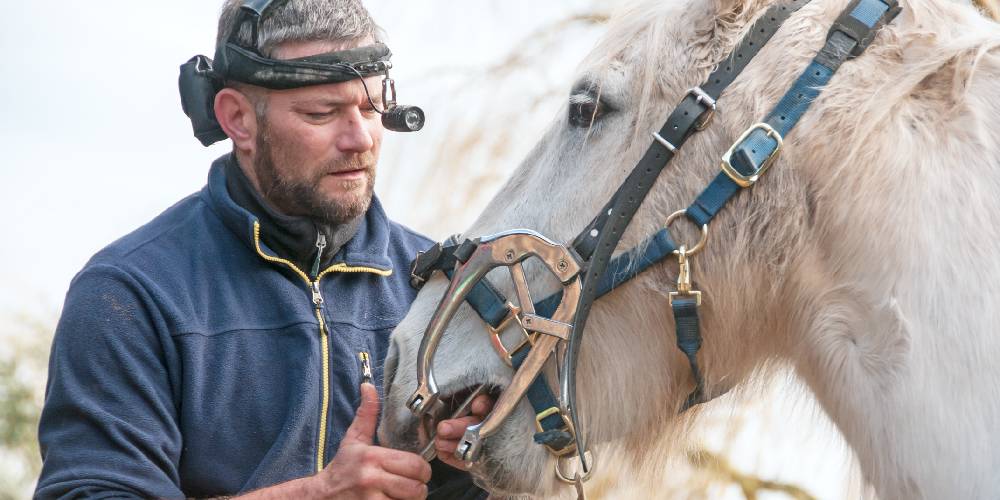Floating is a thing that all horses must go through around once a year. This is needed otherwise the horse’s teeth will wear down to points, hooks, and sharp edges. What is floating though and how do people do it?
What Is Floating?
Floating in horses is basically when an equine dentist or veterinarian will file any sharp edges, ridges, and points on the horse’s teeth back down and smooth. Horses grind their teeth when they eat which can cause their teeth to wear down in certain ways that can make it uncomfortable or difficult for the horse to eat.
How Often Does A Horse Need To be Floated?
Horses need to be floated annually or once per year. Keeping up on this is important to keep your horse eating comfortably and normally.
Sometimes horses won’t require floating for longer than this and they may be fine for up to 2 or 3 years, but checking the teeth regularly is still important to ensure that floating or dentistry is or is not needed.
Who Does The Floating On Horses?
You can use two different people to perform the floating on horses.
The first option is veterinarians. This may be the safest and most reliable choice for someone to perform the floating on your horse. Not only have veterinarians gone through years and years of training and education on horses and how to actually perform floating, but veterinarians are also legally able to use sedation and anesthesia on horses.
The second option is equine dentists. Equine dentists are only trained in dentistry and have many years of experience. The issue with using an equine dentist rather than a veterinarian to do your horse’s teeth is the fact that most equine dentists don’t have a medical degree and aren’t legally supposed to use anesthesia on horses unless they are a veterinarian. Though equine dentists are likely cheaper than veterinarians to use, it is probably best to call a vet out to do the floating.
How Does The Dentist Open The Horse’s Mouth To Access Their Teeth?
In order to access the horse’s teeth, you need to open the horse’s mouth. Asking the horse to hold his mouth open while you file its teeth is a really hard and probably impossible thing to do and ask of the horse.
In order to get back to the horse’s teeth, you must put a special bridle and bit on the horse’s face. This bridle fits around the horse’s teeth and then is cranked open and holds the horse’s mouth open by their teeth.
Do Horses Need To Be Sedated To Float Their Teeth?
In most cases, horses need to be sedated to floet their teeth. Floating is a retty invasive procedure that involves shoving a rasp and file down the horse’s mouth. Because of this, sedation is used on almost all horses not only for the dentist or veterinarian’s safety, but also for the horse’s safety.
If your horse is sedated, he will be a lot more calm and willing to go through with the floating than he would without sedation. Just remember to keep your horse away from food until his anesthesia wears off to prevent the possibility of choke.
What Do You Use To Float The Horse’s Teeth?
Like I mentioned before, veterinarians and dentists will use a special floating bridle on horses to open the horse’s mouth so they can access their teeth.
To do the actuall floating, dentists and veterinarians will use a file to wear the sharp edges, points, and hooks down on the horse’s teeth.
The horse is sedated in most situations so an aesthetic is used to do the sedation and calm the horse down enough to file their teeth down.
What Happens If You File The Horse’s Teeth Too Low?
Horses can in fact have their teeth filed too low. For a horse’s teeth to be considered filed too low, the teeth would no longer meet and a gap would be where the molars should meet.
If a horse’s teeth are filed too low, they have a lot of trouble eating as they aren’t able to make their teeth meet to grinde their food properly. When a horse’s teeth are filed too low they may appear to be spitting their food out or to be losing weight excessively.
What Happens If You Never File Your Horse’s Teeth
Horses need to have their teeth filed. If you neglect to have their teeeth filed, the horse can begin to suffer from:
- Sharp Hooks At The Edges Of The Molars
- Sharp Edges Of The Molars
- Uneven Molar Growth
- Slanted Bite
Taking care of your horse’s teeth is essential to their health. If you don’t file your horses teeth they can start to develop not only dental issues like I mentioned above, but also start to lose weight, have trouble eating, and have other difficulties resulting from poor dental care.

